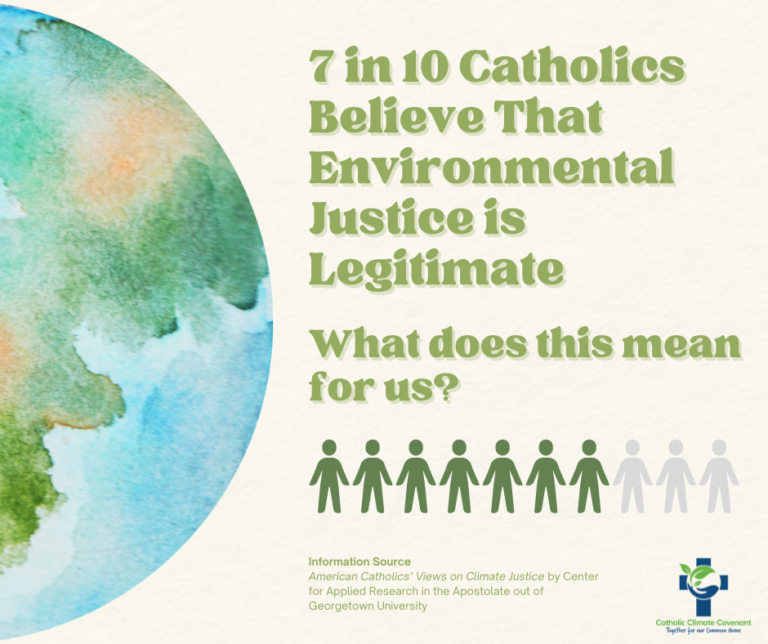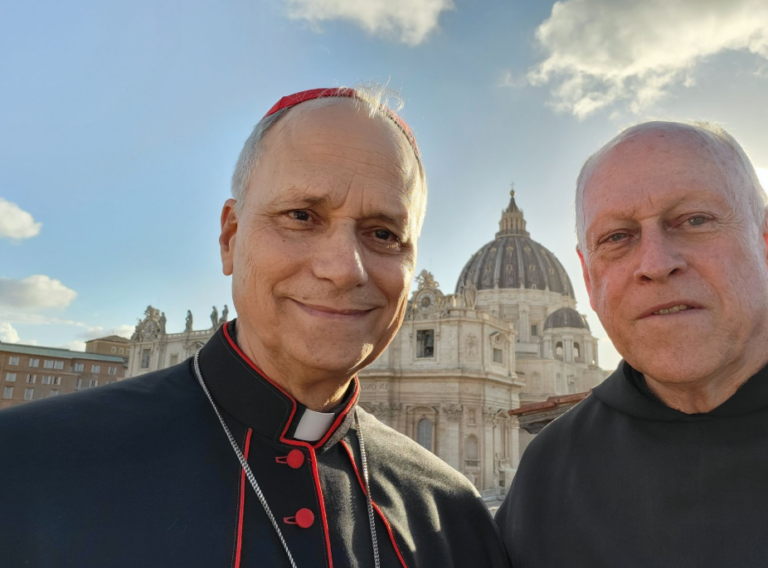You might have recently heard about a study on environmental attitudes of Catholic Americans, conducted by the Center for Applied Research in the Apostolate (CARA) at Georgetown University in Washington D.C.
You might also know that Catholic Climate Covenant was formed in 2006 with the help of the United States Conference of Catholic Bishops (USCCB) to address growing ecological awareness and the need to implement Catholic social teaching on ecology within the U.S. Church. With this in mind, we at the Covenant are very invested in the results of this 130-page report, and what this report means for the work that we do. By the end of this blog, you’ll know more about the specifics of the study, what Catholic Americans believe about environmental justice, and why the Covenant’s work is so important.
About the study
This study, called “American Catholics’ Views on Climate Justice,” was conducted electronically from December 13, 2023 to December 28, 2023. The final sample included 1,342 responses from self-identified Catholics living in the U.S. ages 18 and up. Following data collection and analysis, the report was released March 2024. You can read our summary report after our analysis of the findings.
A researcher’s thoughts
Emma Mitchell, a Research Assistant with the Center for Applied Research in the Apostolate (CARA), shared her personal thoughts and what stuck out to her in the poll results as a young adult concerned about climate change. (A friendly reminder that Mitchell’s thoughts are not representative of all of CARA, but are her own thoughts.)
“There are a lot of different ways one can analyze the findings of the poll — for instance, in this America article, our researcher Michal, who led this poll, chose to analyze the poll focusing on what issues Catholics care the most about and what their partisan leanings are, as we’re in an election year,” Mitchell said.
“As a young adult Catholic, and because of my involvement with Catholic Climate Covenant’s Common Home Corps, I was very interested to see how young adults as a demographic responded to the poll. I was fascinated to find that young adults were more likely to express their personal spirituality and their views on environmental justice to be connected to each other, and, perhaps related to this, young adults were 31 percentage points more likely to have come across the topic of environmental justice in Catholic settings. I was excited to see this integrated worldview coming from young adults, and I look forward to potentially seeing more of a push for climate action in Catholic institutions as young adults take on more leadership roles in the Church.”
Mitchell even wrote about these results in more detail in a CARA blog post. She goes on to explain some of the results that stood out to her.
”I was both surprised and a bit concerned that the findings of this poll were similar to the findings of a similar CARA poll conducted in 2016, only one year after Laudato Si’ was published,” Mitchell said. “I would have hoped that the work of the Church in the past eight years to spread the teaching of the encyclical and put its mandates into practice would have led to increased awareness or conviction among Catholics towards environmental justice, but this seems to not be the case. Still, it is not entirely disappointing — at least Catholics don’t seem to have lost awareness of the teachings of Laudato Si’ in the years since it has been published!”
Mitchell offered what she personally believed the Church and Catholic environmental organizations could do better to help the laity.
“Two things off the top of my head — we could pay more attention to the spaces which young adults are frequenting and cultivating in the Church. If these spaces are more successfully engaging with Catholic teaching on environmental justice, they could model how to teach such an integrated worldview to the rest of the Catholic community,” Mitchell said.
“Second, the poll found that while Catholics said that the Church’s teachings on care for the environment were important to them, they are more concerned today with other problems, including the high cost of living, crime, health care, immigration, and racism. And understandably so! Knowing this, I think it is important to teach Integral Ecology, recognizing that the cry of the Earth and the cry of the poor are one and the same, and the unjust systems which are driving climate change are harming us, our families, and our communities, in more tangible and direct ways as well. The explicit recognition of these intersections should be done by both Catholic environmental organizations and other Catholic organizations working towards economic and social justice, in order to lift up our work as a whole.”
What do the results of this study mean for the Covenant and Catholic environmental organizations?
It means that Catholic environmental organizations and the U.S. Catholic Church have work to do.
- Pastors and other Catholic leaders must do a better job educating the laity about Laudato Si’ and environmental justice
A stunning number of Catholics, according to this survey, have never heard of Pope Francis’s encyclical Laudato Si’. A good number of Catholics also cannot adequately define environmental justice or climate change. This means that this topic is not being adequately discussed on the parish and diocesan levels. To make more progress on addressing creation care, the laity clearly needs better formation on Church teaching about the environment. This is where organizations like Catholic Climate Covenant come in, to help bridge the gaps and mobilize individuals who are climate-conscious, and by creating programs for Catholics to engage while raising concerns with clergy and other leaders.
- Pastors and other Catholic leaders must do a better job of reminding Catholics of their moral responsibility
Catholic teaching is clear: we have a moral responsibility for each other and for God’s gift of creation. Matthew 25:36-40 reminds us that Catholics are called to see Christ in every person:
“I was naked, and you clothed me, I was sick, and you visited me, I was in prison, and you came to me. Then the righteous will answer him, saying, ‘Lord, when did we see you hungry and feed you, or thirsty and give you drink? And when did we see you a stranger and welcome you, or naked and clothe you? And when did we see you sick or in prison and visit you?’ And the King will answer them, ‘Truly, I say to you, as you did it to one of the least of these my brothers, you did it to me.’”
Climate impacts, especially on the poor and most vulnerable, are not an exception to this rule.
- The Church must remind Catholics that an inhabitable environment is a pro-life issue
Many Catholics who do not make a connection to environmental justice or feel motivated to work to mitigate climate change may still identify strongly with pro-life causes. Yet climate change is a threat to human health and well-being. Scientists worry that a dramatically altered climate could result in food shortages, devastating droughts and floods, and other impacts. In fact, we are already seeing these deadly changes. Clergy and Catholic environmental organizations need to help make climate change a pro-life issue, imploring all Catholics to take these signs seriously, especially for generations unborn.
- The Church and environmental organizations must work to bridge the partisan divide
Today, many topics and causes demonstrate clear partisan divides in our country. These divides have impacted our Church just as much as the general population. Too many of us identify first with our political affiliation rather than with our faith and the teachings of the Church. Unfortunately, this is true with the issue of climate change. We all have the responsibility to more fully live our faith, regardless of our political leanings, and be encouraged to allow our faith to guide our politics rather than the other way around. Pastors, especially, can help guide us so we might better understand the beauty of Catholic social doctrine which, in turn, can help to depolarize our politics and destigmatize justice issues. Our faith must transcend politics and heed God’s call to be good stewards of the Earth, regardless of who we vote for.
- The Church and environmental organizations must help young Catholics act on their beliefs out in the community
Overwhelmingly, young Catholics reported more than any other age group that they are familiar with environmental justice, involved in environmental justice efforts, and are concerned about how they themselves and their loved ones will be impacted by climate change in their lifetimes. Today, there are few greater tools to help engage young people in the Catholic faith than for their parishes and schools to be visibly engaged in environmental justice and climate action. Additionally, it is the role of Catholic environmental organizations like Catholic Climate Covenant to harness the concern and passion that many young Catholics share for environmental justice and channel it into action. Catholic Climate Covenant does this through youth formation, programs, and mobilization efforts — efforts that we will continue to expand around the country.
While the CARA report indicates progress with some members of the U.S. Catholic laity, there is still work to be done. The U.S. Church, its clergy, laity, and Catholic environmental organizations must be willing to rise and meet the challenge if we are to adequately care for our common home.
Summary of the report by section
Demographic data
The CARA report indicates that, of the 1,342 respondents, 32 percent live in the South, 28 percent live in the Northeast, 21 percent live in the West, and 20 percent live in the Midwest. 48 percent live in suburban areas, 37 percent live in cities and urban areas, and 15 percent live in rural areas. 90 percent of respondents were born in the U.S. or a U.S. territory.
80 percent of respondents are White, 7 percent are Black or African American, 3 percent are Asian, and 10 percent are of another race. 37 percent of respondents, according to the report, are of Spanish, Hispanic, or Latino ethnicity.
55 percent of respondents are female and 45 percent are male. 12 percent of respondents are 18 to 24 years old. 15 percent of the respondents are 25 to 34 years old. 12 percent of respondents are 35 to 44 years old. 19 percent of respondents are 45 to 54 years old. 20 percent of respondents are 55 to 64 years old. 22 percent of respondents are 65 years old and older.


Of these respondents, 42 percent identify as Democrats. 31 percent identify as Republicans. 25 percent identify as independents. 2 percent identify as something else — either a mix of parties, or no political party.


Religious data and priority issues
The CARA report asked respondents about faith in general before diving into questions about the environment and environmental justice. 71 percent of respondents identify as “mostly” or “very much” Catholic, as opposed to “not much at all” or “somewhat or a little.”
19 percent reported attending Mass weekly or more often, while 29 percent of respondents attend Mass “rarely or never.” A third of respondents reported being “very involved” or “somewhat involved” in parish activities or ministries, other than attending Mass. 45 percent of respondents reported spending time doing private religious activities weekly, such as prayer, the rosary, or Lectio Divina, while 33 percent of respondents reported participating in those activities “rarely or never.” 72 percent of respondents experience religious feelings, such as the presence of God in their lives. 64 percent of respondents reported that religious beliefs propel their approach to life. 63 percent of respondents try to carry their faith into all of the other areas of their lives.
74 percent of respondents considered the Church’s teachings on marriage to be “somewhat” or “very” important. 66 percent reported feeling this way about the environment. 56 percent reported feeling this way about migration, refugees, and immigrants. 53 percent reported feeling this way about abortion. 52 percent felt this way about the death penalty. 48 percent felt this way about birth control. 47 percent felt this way about euthanasia.

Beliefs on environmental justice and environmental issues
According to the CARA report, only 11 percent of respondents indicated that they “know well” what environmental justice is about, while 32 percent of respondents indicated that they have a general understanding of environmental justice. 32 percent reported hearing about environmental justice, but not knowing what it is, while 25 percent of respondents have never heard of it.
22 percent of respondents understood environmental justice as “equal access for all people to a healthy environment in which to live,” while 20 percent of respondents understood environmental justice as “fair and meaningful participation (of all people) in the development, implementation, and enforcement of environmental regulations.”

61 percent of respondents reported coming across the topic of environmental justice at some point in the last three months from a Catholic source, such as a Catholic website, book, magazine, newspaper, or Mass. Interestingly respondents reported relying “on various authorities to judge reports on the environment including various media sources, educated professionals/experts, government organizations, personal observations, religious authorities, non-profit organizations, and personal connections.”
67 percent of respondents agree that the Earth’s temperatures are getting warmer. 66 percent also agree that greenhouse gases harming the ozone layer are largely the result of human activity.


A whopping 72 percent of respondents, or 7 in 10 Catholics, believe that environmental justice is a legitimate issue that needs urgent attention, compared to 28 percent of respondents who disagree. 62 percent of respondents are concerned climate change will harm them personally, while 38 percent are not. 43 percent of respondents said that they or someone they know has been impacted by climate change, while 57 percent have not.
Engagement and involvement
The CARA report also asked respondents about their personal involvement in environmental justice. 76 of respondents believe that they have a moral responsibility to personally do what they can to combat climate change, while 24 percent of respondents disagreed.


81 percent of respondents engaged in an environmental justice related activity in the past three months. Most commonly, respondents reduced waste or actively recycled (a practice that 55 percent of U.S. Catholics are reported to follow). 18 percent of respondents incorporated environmental justice into their decisions as consumers, while 18 percent donated to environmental justice related causes, among other activities.
Among the 81 percent of respondents who engaged in an environmental justice related activity in the past three months, 44 percent of them reported that they were motivated “very much” or “somewhat” by their Catholic faith and beliefs.
Overlap in environment and faith
The CARA report also asked respondents about their attitudes toward environmental justice in the context of their Catholic faith. 54 percent of respondents do not believe God has played a role in climate change, while 46 percent believe that God has played a role. Respondents pointed a finger at several organizations for not doing enough — 44 percent blamed their diocese, 43 percent blamed the USCCB, 42 percent blamed their parish, 42 percent blamed religious order, 40 percent blamed Catholic nonprofits, 38 percent blamed themselves, and 31 percent blamed Pope Francis.

Only 33 percent had heard about Pope Francis’s encyclical Laudato Si’, while 67 percent had not. 23 percent of respondents had seen Laudato Si’ affecting them personally, 29 percent have seen it affecting their communities, and 32 percent have seen it affecting their communities. 44 percent agree that Catholics are morally responsible for the environment, with 19 percent of that 44 percent strongly agreeing. 69 percent believe that it is “important” or “very important” for Catholics to engage in environmental justice. Of that 69 percent, 22 percent believe that it is “very important.”

23 percent of respondents, however, said that the Church should not be involved in environmental justice. 46 percent of respondents said they would like to see the Church engage in environmental justice issues by educating and raising awareness, which 45 percent would like to see the Church create volunteering opportunities.

Differences in demographics
Some demographic groups were more or less likely than others to feel a certain way. According to the CARA report, young adult Catholics were more likely than older Catholics to come across environmental justice topics. Young adult Catholics were also more likely to have heard about and know about environmental justice, believe that environmental justice is an important issue worthy of action, worry that climate change will impact them personally at some point, know someone who has been impacted, and rank it as more important on their list of important issues.
Additionally, in the context of their Catholic faith, young adults are more like to have heard about Laudato Si’, have seen Laudato Si’ impacted this communities and people they know, are less likely to think that the USCCB, religious orders, Catholic nonprofits or they themselves are doing too little.
The CARA report also indicates a partisan divide. U.S. Catholics who identify as Republican are less likely to believe that environmental justice is a legitimate issue worthy of action, concerned that climate change will harm them personally at some point, know someone who has been affected by climate, believe that climate change is real, adequately define what climate change or environmental justice is, believe that they have a moral responsibility to do something about it, or engage in an environmental justice related issue compared to their Democratic Catholic counterparts.




